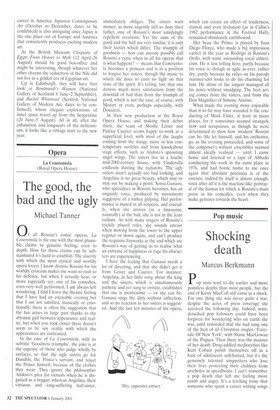La Cenerentola (Royal Opera House)
The good, the bad and the ugly
Michael Tanner
Of all Rossini's comic operas, La Cenerentola is the one with the most plausible claims to genuine feeling, even to depth. How far those claims can be substantiated it's hard to establish. The alacrity with which the most cynical and worldly opera lovers I know dismiss Rossini for his worldly cynicism makes me want to rush to his defence, but when I actually hear, or more especially see, one of his comedies, even very well performed, I am always left wondering. I find I leave the theatre feeling that I have had an enjoyable evening but that I am not satisfied, musically or emotionally: there is often the suggestion that the fun arises in large part thanks to the abysmal gulf between appearance and reality, but when you look closer there doesn't seem to be any reality with which the appearances arc contrasted.
In the case of La Cenerentola, with its subtitle 'Goodness triumphs', the joke is at the expense of those who judge wholly by surfaces, so that the ugly sisters go for Dandini, the Prince's servant, and reject the Prince himself, because of the clothes they wear. They ignore the philosopher Alidoro's plea for victuals when he is disguised as a beggar, whereas Angelina, their virtuous and long-suffering half-sister, immediately obliges. The sisters want money, as more urgently still so does their father, one of Rossini's most satisfyingly repellent creations. Yet the aims of the good and the bad are very similar; it is only their tactics which differ. The triumph of goodness — how can anyone possibly call Rossini a cynic when in all his operas that is what happens? — means that Cenerentola becomes a princess and is in a position to forgive her sisters, though the music to which she does so casts no light on that state of the spirit. It's telling, too, that one derives much more satisfaction from the downfall of bad than from the triumph of good, which is not the case, of course, with Mozart or even, perhaps especially, with Don izetti.
In their new production at the Royal Opera House, and making their debut there, the team of Moshe Leiser and Patrice Cauricr seems happy to work at a superficial level, with most of the laughs coming from the slangy, more or less contemporary surtitles and from knockabout stage effects, such as Alidoro's sprouting angel wings. The sisters live in a louche mid-20th-century house, with Cinderella endlessly dusting the radiators. The ugly sisters aren't actually too bad looking, and Angelina is no great beauty, which may or may not be making a point. Sonia Ganassi, who specialises in Rossini heroines, has an ungainly voice, produced by movements suggestive of a turkey gulping. Her performance is muted in all respects, and crucially, when she arrives (in a limousine, naturally) at the ball, she is not in the least radiant. As with many singers of Rossini's trickily placed roles, she sounds uneasy when moving from the lower to the upper register or down again, and can't produce the requisite fireworks at the end which arc Rossini's way of getting us to realise what an extreme of happiness or rage his characters are experiencing.
I have the feeling that Ganassi needs a lot of directing, and that she didn't get it from Leiser and Caurier. For instance: Angelina, in her little song about the king and the sisters, which is simultaneously pathetic and yet sung to irritate, establishes that she is mettlesome — or she can be; Ganassi sings the ditty without inflection, and so no reaction to her sisters is suggested. And the last ten minutes of the opera,
which can create an effect of tenderness, elation and even levitation (as in Callas's 1962 performance at the Festival Hall), remained obstinately earthbound.
Her beau the Prince is played by Juan Diego Florez, who made a big impression earlier in the year as Rodrigo in Rossini's Otello, with some astounding vocal athleticism. He is less telling here, partly because his voice is, though as agile as ever, rather dry; partly because he relies on his parody matinee-idol looks to do his charming for him. He alone of the singers managed all his notes without smudging. The best acting comes from the sisters, and from the Don Magnifico of Simone Alaimo.
What made the evening more enjoyable than it so far may have sounded is the conducting of Mark Elder. at least in many places, for it sometimes seemed strangely slow and scrupulous, as though he were determined to show how 'modern' Rossini can be. He let himself, and his orchestra, go, as the evening proceeded, and some of the composer's wittiest ensembles seemed almost ideally realised — until I came home and listened to a tape of Abbado conducting the work in the same place in 1976, and had borne home to me once again that absolute precision is of the essence, indeed by itself is almost enough, since after all it is the machine-like portrayal of the human lot which is Rossini's main point in his comedies, even when they make gestures towards the heart.


















































 Previous page
Previous page